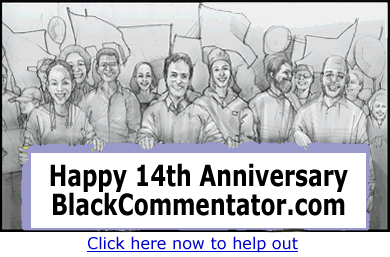|
Note:
This commentary was originally published by BC over ten years
ago. It is an excellent example of the strength and depth of our
archives.
Many
people working for justice today stand on the shoulders of Martin
Luther King, Jr., but I believe King's vision of justice is often
gravely limited and misunderstood. Too many people thought then, and
continue to think, that King's statements regarding justice were only
about race and the African-American community. We fail to see how
King's vision of inclusion and community is far wider that we might
have once imagined.
For
King, justice was more than a racial issue, more than a legal or moral
issue. Justice was a human issue. And this was evident in King's
passionate concern about a wide range of concerns: "The revolution for
human rights is opening up unhealthy areas in American life and
permitting a new and wholesome healing to take place," King once told a
racially-mixed audience. "Eventually the civil rights movement will
have contributed infinitely more to the nation than the eradication of
racial injustice."
Moral
leadership played a profound role in the justice work that King did. He
argued that true moral leadership must involve itself in the situations
of all who are damned, disinherited, disrespected, and dispossessed,
and moral leadership must be part of a participatory government that is
feverishly working to dismantle the existing discriminatory laws that
truncate full participation in the fight to advance democracy. And
surely part of our job in keeping King's dream alive is also to work to
dismantle discriminatory laws and dehumanizing structures.
But
if King were among us today, he would say that it is not enough just to
look outside ourselves to see the places where society is broken. It is
not enough to talk about institutions and workplaces that fracture and
separate people based on race, religion, gender, and sexual
orientation. We must also look at the ways that we ourselves manifest
these bigotries, how we are the very ones who uphold and are part of
these institutions and workplaces.
Often,
we find that these institutions and workplaces are broken,
dysfunctional, and wounded in the very same ways that we are. The
structures we have created are mirrors not of who we want to be, but of
who we really are.
King
would remind each of us that we cannot heal the world if we have not
healed ourselves. So perhaps the greatest task, and the most difficult
work we must do in light of King's teachings, is to heal ourselves. And
this work must be done in relationship with our justice work in the
world.
In The Old Man and the Sea,
Ernest Hemingway said that the world breaks us all, but some of us grow
strong in those broken places. King’s teachings invite us to
grow strong in our broken places - not only to mend the sin-sick world
in which we live, but also to mend the sin-sick world that we carry
around within us. And we can only do that if we are willing to look
both inward and outward, healing ourselves of the bigotry, biases, and
the demons that chip away at our efforts to work toward justice in this
world. And our differences have been used to divide us instead of unite
us, so consequently we reside in a society were human brokenness, human
isolation and human betrayal are played out everyday.
I
know that the struggle against racism that King talked about is
only legitimate if I am also fighting anti-Semitism, homophobia,
sexism, classism - not only out in the world but also in myself.
Otherwise, I am creating an ongoing cycle of abuse that goes on
unexamined and unaccounted for.
We
are foolish if we think we can heal the world and not ourselves. And we
delude ourselves if we think that King was only talking about the
woundedness of institutional racism, and not the personal wounds we all
carry as human beings.
Ironically,
our culture of woundedness and victimization has bonded us together in
brokenness. The sharing of worlds to depict and honor our pain has
created a new language of intimacy, a bonding ritual that allows us to
talk across and among our pains. In exploring our common wounds, we
sometimes feel more able to find the trust and the understanding that
eludes us as "healthy" people.
When
we bond in these unhealthy ways we miss opportunities in ourselves for
moral leadership, and to work collaboratively with others to
effect change in seemingly small ways that eventually lead to big
outcomes.

Both
Rosa Parks and Martin Luther King Jr. were leaders in the Montgomery
bus boycott in challenging Alabama’s Jim Crow laws. Both were
working together for a desired outcome, and they could not have
done it without each other.
Had
Rosa Parks not sat down by refusing her seat to a white man that day on
the bus in December 1955, King could not have stood up,
which catapulted the civil rights movement.
Each
year, I mark the Martin Luther King holiday by reexamining myself in
light of King’s teachings. And in so doing, I try to uncover not
only the ways in which the world breaks me, but also how it breaks
other people that keeps us fractured instead of united toward a
common goal - a multicultural democracy.
I
believe that when we use our gifts in the service of others as King has
taught us, we then shift the paradigm of personal brokenness
to personal healing. We also shift the paradigm of looking
for moral leadership from outside of ourselves to within ourselves;
thus, realizing we are not only the agents of change in society,
but also the moral leader we have been looking for.
Our
job, therefore, in keeping King's dream alive is to remember that
our longing for social justice is also inextricably tied to our longing
for personal healing.
|

